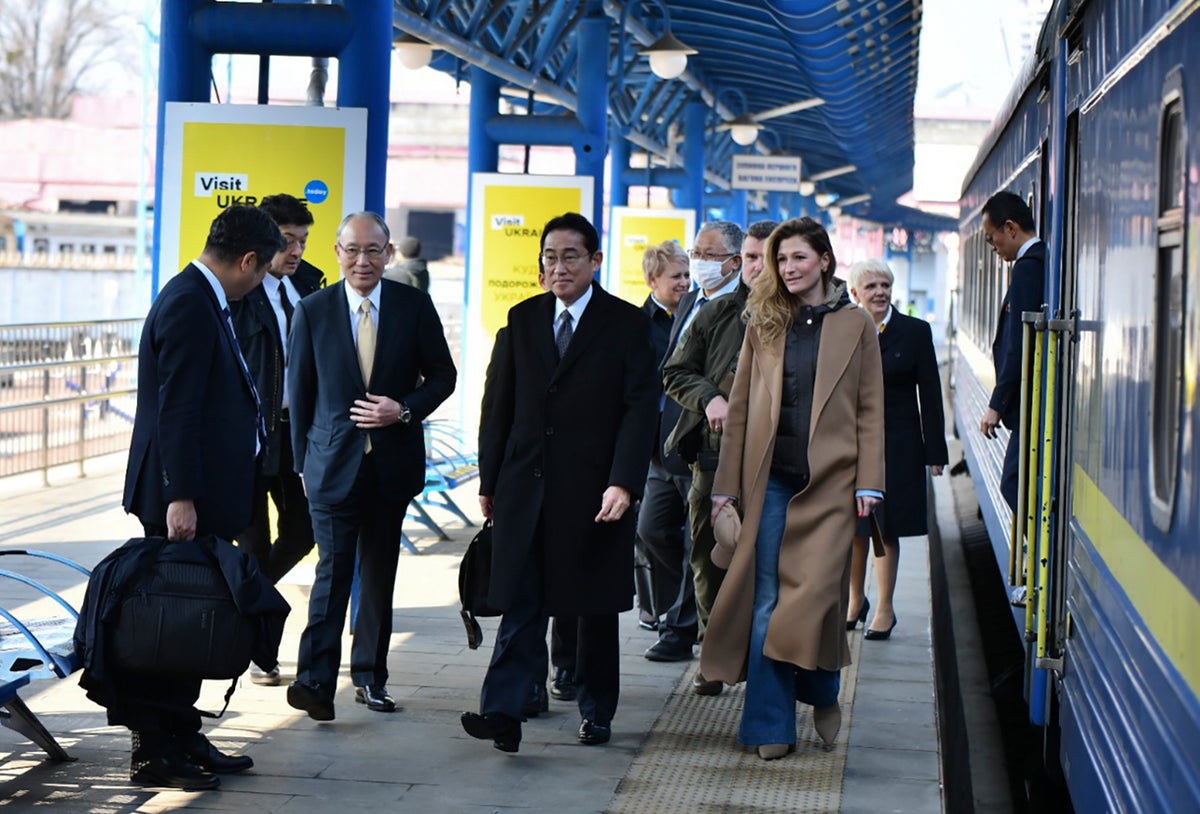
While Vladimir Putin was meeting his “dear friend” Xi Jinping in Moscow, the Japanese prime minister, Fumio Kishida, was 500 miles away in Kyiv showing his country’s solidarity with Ukraine.
The presence of the two Asian leaders in the rival capitals illustrated the global impact of this conflict in the heart of Europe, with old strategic alliances being strengthened and new ones being formed.
For Japan, which currently holds the presidency of the G7, it is a sign of a more robust foreign and defence policy, alongside a major rearmament programme underway for its military – as Tokyo responds to an increasingly uncertain and dangerous world.
Japan has provided the government of Volodymyr Zelensky with humanitarian, financial and defensive, non-lethal military aid following the invasion. It has also been a strong supporter of Western sanctions against Moscow and backed investigations into Russian war crimes.
Kishida visited a church in Bucha, the town near Kyiv – which suffered Russian atrocities – and laid flowers for the victims. “The world was astonished to see innocent civilians in Bucha killed one year ago: I am outraged by the cruelty. I represent the Japanese citizens to express my condolences to those who lost their lives... we will maximum support to Ukraine to restore peace,” said the prime minister.
In a recent speech, Kishida declared: “Russia’s aggression against Ukraine has marked the complete end of the post-Cold War world. It has come to light that globalisation and interdependence alone cannot serve as a guarantor for peace and development across the globe.”
Beijing, he said, posed a similar danger with its threats to invade Taiwan: “China has some visions and claims on the international order that diverge from ours and that we can never accept.”
Tokyo has its own territorial dispute with Russia, going back to the end of the Second World War, over the Kuril islands in the North Pacific. The Kremlin has been increasingly flexing its muscle over the standoff. On Wednesday, with Xi in Moscow and Kishida in Kyiv, two Russian nuclear-capable bombers – escorted by fighters – flew over the Sea of Japan. The Ministry of Defence in Moscow said in a statement that the flight had been “carried out in strict compliance with international law and taken place over neutral waters”.
Russia started placing coastal defence missile systems in the Kurils last December. Japanese defence officials believed at the time that this was due to be followed by the stationing of a hypersonic missile system. The missiles, however, are believed to have been diverted to Ukraine instead.
China recently fired the Dongfeng-17 mobile hypersonic system during military exercises near Taiwan, in yet another round of sabre-rattling. Last year Beijing successfully tested a nuclear-capable hypersonic missile which circumnavigated the world. US officials reportedly said at the time “we have no idea how they did this”.
These are the type of advanced weapons Russia would ideally like to get from China with its own stock of hypersonic missiles running low. It should be stressed, however, that Western intelligence sources say they have no indication, for now, that China is supplying Moscow with arms for the war.
China has its own dispute with Japan, over the ownership of the Senkaku Islands in the East China Sea, which China calls the Diaoyu Islands. Beijing had supported the Soviet Union over the Kurils in the 1950s, before switching sides following the Sino-Soviet border clashes in the 1960s. In July 2021, amid fractious relations with Tokyo, there was another change by Beijing with a flip-back to accepting Russian sovereignty.
In October 2022, Ukraine, which had until then shown no interest in a quarrel over islands on the other side of the world, passed a parliamentary vote recognising the Kurils as Japanese and condemning “illegal occupation” by Russia.
The Japanese prime minister’s visit to Ukraine is part of a complex diplomatic picture. He travelled to Kyiv from India where he had been on a two-day visit. The two countries, strong allies, are part of the “Quadrilateral” group along with the US and Australia is a counter-balance to rising Chinese hegemony.
At the same time India, which holds the presidency of the G20, has been buying oil Russia has been forced to sell on the cheap due to Western sanctions. Narendra Modi’s government has also abstained on UN votes condemning Russia over the Ukraine war.
Criticism from the West over this has been notably muted – the US sees India as a key ally against China as the Biden administration continues with its Indo-Pacific tilt.
Realpolitik, in the end, wins the day.







